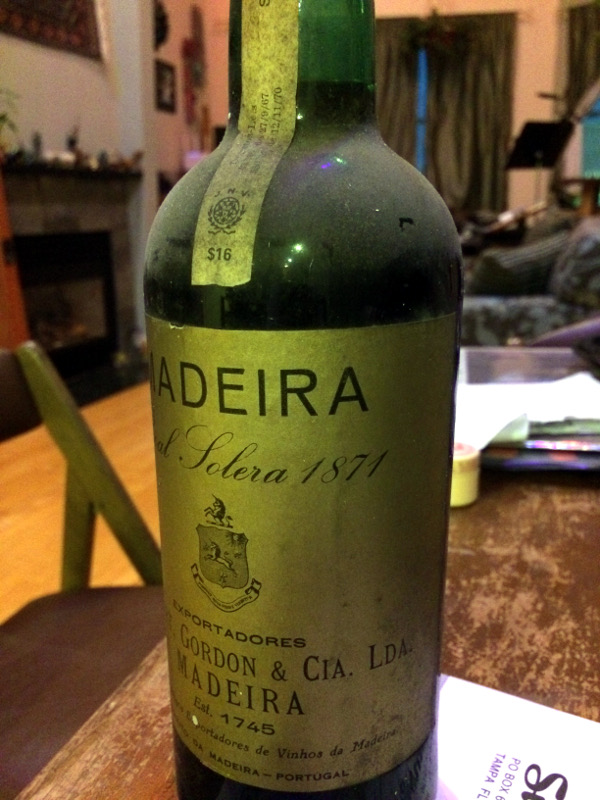I don't know if anyone else really nerds out on food history, but it's one of the things that I really enjoy. Indulge me in sharing my latest little internet journey.
Someone linked me to the University of Houston library archives where they have digitized and posted a large number of menus from American restaurants from the 1850s and 60s. It's always fun seeing what was being served and how. Go there now! A particularly interesting one to me is the Barnum's City Hotel in Baltimore from 1860. (The Gentleman's Ordinary, 2 1/2 o'clock!)
Something that struck me was the wine lists. Sure, the $2.50 Chateau Lafite from 1834 is striking. But I couldn't get over how much longer the list of Madeiras were than anything else. There are more options, they are more prominently placed, have longer descriptions, and are the most expensive offerings. Which just seemed crazy to me since Madeira isn't popular at all anymore. So I went on a hunt to find out why Madeira seemed to be a thing 150 years ago and why it stopped.
It turns out I had to go to 1663 to find the answer. One of the navigation acts from the Parliament of the newly restored Charles II, which was later renamed "An Act for the Encouragement of Trade". It included the passage:
tl;dr Everything that is shipped from Europe to the Colonies must go through England first. So, wine from France and Germany must go to England, get unloaded, taxed, catalogued, and reloaded to make the trip to the American Colonies. But later in the act, there's this:Originally Posted by Parliament of 1661
So, with Madeira being an island 400 miles off the African coast, it was preferred by merchants who were trafficking humans to make the stop along the way to the colonies and load in some extra good for sale. With Madeira being exempted from the odd shipping requirements, it became both cheaper and more available than the more popular wines in Europe, but it wasn't the only thing that made Madeira the wine of early America.Originally Posted by Paliament of 1661
It turns out that the stuff actually gets better with abuse. Back to the Barnum's menu--there's a Madeira listed that says "M.T. Montiero, imported 1832, one voyage to east indies" Legend (and I can't find a primary source on this one) has it that a barrel was forgotten on a ship where it was supposed to be off-loaded in India, and this barrel having been subjected to two trips across the equator, was even better than when it had left, or it's partners at the destination. We no longer send Madeira on voyages around the world for aging in hot ship holds, but we do intentionally oxidize the wine--a process called Estufagem, which can either be steam heating or leaving barrels in a greenhouse of sorts in the sun.
So Madeira was America's wine, and basically no one drinks it anymore, so what happened? Like much of history, a quick succession of blows doomed Madeira wine. First, Phylloexora reached the island in the latter half of the 19th century, with production being thoroughly decimated by 1890. Combine the timing with 1859 being the first commercial winery opening in the Napa Valley, and then just as root stock was taking hold and production ready to recover in Madeira, Prohibition in America, and revolution in Russia.
I tend to really geek out hard over stuff when learning about it, and hadn't ever even had Madeira before, so I went out and grabbed a couple of bottles. The Rare Wine Co. local to me produces a series of blends with a Madeira negociant meant to replicate the historical styles (the 4 "heritage" varietals Malvasia, Bual, Verdhello, and Sercial were mostly ripped out after the Phylloexora epidemic, but towards the end of the 20th century were being replanted) at reasonable prices. It's really, really good stuff! It's kind of like a vintage port with more acidity and body and much less of a tendency towards cloying sweetness. Absolutely spectacular with cheese. And so I splurged on something special. Just need an occasion soon.
Anyway, if you made it this far, thanks for reading. Just wanted to share my excitment. If you have food history stories, historical menus, or recipe books, I'd love to read about it!


 Likes:
Likes: 


 Reply With Quote
Reply With Quote


Bookmarks